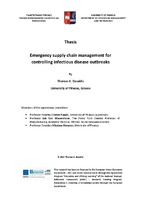| dc.contributor.advisor | Παππής, Κωνσταντίνος | |
| dc.contributor.author | Δασακλής, Θωμάς | |
| dc.date.accessioned | 2016-06-08T07:48:36Z | |
| dc.date.available | 2016-06-08T07:48:36Z | |
| dc.date.issued | 2015 | |
| dc.identifier.uri | https://dione.lib.unipi.gr/xmlui/handle/unipi/8797 | |
| dc.format.extent | 209 | el |
| dc.language.iso | en | el |
| dc.publisher | Πανεπιστήμιο Πειραιώς | el |
| dc.rights | Attribution-NonCommercial-NoDerivatives 4.0 Διεθνές | * |
| dc.rights.uri | http://creativecommons.org/licenses/by-nc-nd/4.0/ | * |
| dc.title | Emergency supply chain management for controlling infectious disease outbreaks | el |
| dc.type | Doctoral Thesis | el |
| dc.contributor.department | Σχολή Ναυτιλίας και Βιομηχανίας. Tμήμα Βιομηχανικής Διοίκησης και Tεχνολογίας | el |
| dc.description.abstractEN | Outbreaks of communicable diseases occurred many times in the past with a devastating effect on all aspects of human life in the infected regions. The importance of addressing infectious disease outbreaks nowadays is even greater as the general framework in which they might occur has dramatically changed. New challenges have arisen and certain drivers like climate change, population density and urbanization could serve as catalysts for the acceleration of pandemic incidents. A possible outbreak combined with changes in demographic conditions like population distribution, size and density could potentially lead to a pandemic of unprecedented proportion where available capacities and control resources could be strained to their limits.
Effective control of an infectious disease outbreak calls for a rapid response. Available resources such as essential medical supplies and well-trained personnel need to be deployed rapidly and to be effectively managed in conjunction with available information and financial resources in order to contain the epidemic before it reaches uncontrollable or disastrous proportions. Therefore, the establishment and management of an emergency supply chain during the containment effort are of paramount importance.
Planning and implementing control strategies and actions, however, is not a straightforward process since outbreaks of communicable diseases are highly context-specific. For instance, disease outbreaks may occur in the context of natural causes such as the recent outbreak of novel influenza A(H1N1) virus. Outbreaks of communicable diseases are also very common in complex humanitarian emergencies. Acute respiratory infections, measles, malaria and diarrhea are the most prevalent infectious diseases in these settings and all of them are closely related to unsanitary health conditions and malnutrition of the population affected. Last but not least, deliberate bioterrorist actions and the release of biological warfare agents could also lead to disease outbreaks. Planning and implementing control strategies and actions also requires disease-specific approaches. For instance, different diseases require different control protocols to be followed and, therefore, different operational issues may arise during the containment effort. Therefore, one-size-fits-all approaches in the case of epidemics control are not suitable and special attention should be paid to both the agent triggering the outbreak as well as to the general context in which the outbreak occurs.
Based on the particularities described above, this thesis studies the influence of resource allocation and operations management on controlling infectious disease outbreaks for three distinct cases; the first being for epidemics attributed to natural causes, the second being for disease outbreaks due to deliberate bioterrorist actions and the third being for outbreaks in the aftermath of natural or man-made disasters. Influenza, smallpox and cholera have been chosen as the main infectious agents to be studied in each case respectively.
The main contribution of this thesis is the development of mathematical modelling approaches for managing the response operations during the containment effort of infectious disease outbreaks. Several operational and resource allocation constraints like limited medical supplies or limited response capacities for performing control actions are explicitly modeled. The methodologies applied are mainly of quantitative nature and are based on operations research techniques like linear programming, combinatorial optimization, heuristic algorithms etc. Finally, some qualitative aspects of response operations are also examined. | el |
| dc.subject.keyword | Infectious Disease Outbreaks | el |
| dc.subject.keyword | Emergency Supply Chain Management | el |
| dc.subject.keyword | Points of Dispensing | el |
| dc.subject.keyword | World Health Organization | el |
| dc.subject.keyword | National Stockpile Centre | el |
| dc.subject.keyword | Complex Humanitarian Emergencies | el |
| dc.subject.keyword | Geographical information systems | el |
| dc.subject.keyword | Administrative Health District | el |
| dc.subject.keyword | Health information system | el |



